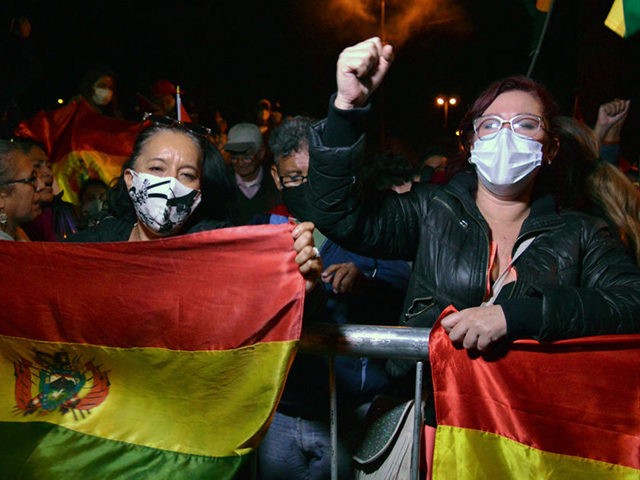Thousands in at least four cities in Bolivia — including nearly 5,000 in Santa Cruz, the nation’s largest city — took to the streets Tuesday to protest the presumed victory of Movement Towards Socialism (MAS) party candidate Luis Arce in this weekend’s presidential election.
Arce declared himself the winner in the early morning hours of Monday, when the nation’s Supreme Electoral Tribunal (TSE), responsible for ensuring secure election results, had tallied less than six percent of the vote.
The 2020 Bolivian presidential election was scheduled after the Organization of American States (OAS) revealed evidence of widespread fraud in the nation’s scheduled election a year ago, during which longtime strongman leader Evo Morales was the MAS candidate. Morales had unconstitutionally changed election rules to allow him to run for a fourth term. When the OAS revealed evidence of fraud in his supposed victory, he abruptly resigned and fled to Mexico.
The OAS has not issued any similar declaration disparaging the vote-counting in Sunday’s election, though the TSE at press time has not concluded the tally. Secretary of State Mike Pompeo congratulated Arce on Wednesday on winning the presidency in a “credible process.”
Despite this, many Bolivians fear that fraud catapulted Arce’s MAS party back into the nation’s leadership after years of Morales corroding public trust in institutions. According to the Bolivian newspaper Página Siete, protesters organized in four cities on Tuesday: the aforementioned Santa Cruz; Sucre; Morales’ stronghold of Cochabamba; and Oruro. Protesters reportedly burned tires to create bonfires and chanted “fraud!” and other anti-government slogans.
In Cochabamba, Página Siete reported the slogan of choice to be “Who’s tired? Nobody’s tired! Who will surrender? No one will surrender!” The protesters demanded an audit of the TSE’s official work in counting the votes.
The Argentine news publication Infobae reported that nearly 5,000 people convened in Santa Cruz to demand a recount or annulation of the election. Infobae noted that the protests do not appear to be organized by any political party, but rather grassroots activists on social media. Santa Cruz’s protests were the largest, the outlet added, as it was one of the few to vote for Luis Fernando Camacho, the most successful of the conservative candidates in the election.
Camacho is one of the few presidential candidates to publicly question the election, writing on Facebook that the TSE had “very poorly administered” the vote.
Camacho’s vice-presidential running mate, Marco Punari, publicly stated on Tuesday that he believed unspecified individuals committed “latent fraud” in the election. Punari explained in remarks this week that he believed the fraud to be “latent” because the issue was not overt cheating, but the fact that the officials running the TSE assumed their positions under Morales and his MAS party.
“The fraudulent MAS machine was never dismantled, which is why Evo Morales was so nervous about ensuring these elections were held under the same rules and with a unique perfection to realize the fraud,” Punari said, according to Bolivia’s El Deber.
The TSE has rejected the accusations of fraud.
“All of us political, social, and regional actors must respect the results of the 2020 election and make the election a moment of trust in democracy,” Salvador Romero, the head of the TSE, said on Tuesday. “The elections were clean, the vote count was transparent, therefore, we urge citizens to await the results calmly.”
The TSE had vowed to complete its counting of the votes by Tuesday. As of Wednesday afternoon local time, however, its official website states that officials have counted only 88.77 percent of the vote. The count currently places Arce’s MAS party in first place with 54.52 percent of the vote, trailed distantly by center-left candidate Carlos Mesa with 29.27 percent of the vote. Camacho’s party currently stands at 14.10 percent.
A candidate can only win the Bolivian election if they receive over 50 percent of the vote. If they are in first place but receive less than that, the government schedules a run-off election in which only the top two vote-getters are on the ballot.
“The gap [between Arce and Mesa] is absolutely clear, there is absolutely nothing in dispute,” political researcher Franklin Pareja told Página Siete on Wednesday, suggesting that there is little chance of Arce dipping under 50 percent by the time all votes are in. This was not true at the time in which Arce — and, from self-imposed exile in Argentina, Evo Morales — declared victory on Monday, when about six percent of the vote had come in. The gap between Arce and Mesa widened, rather than narrowed, as the TSE’s counts came in.
“The United States congratulates Bolivian President-elect Luis Arce and Vice President-elect David Choquehuanca, whom the Bolivian people chose in their October 18 national elections,” Secretary of State Pompeo said in a statement Wednesday. “We recognize Supreme Electoral Tribunal President Salvador Romero and all of Bolivia’s electoral authorities for overseeing this credible process, along with the hard work and peaceful conduct of Bolivian voters, political parties, civil society, and the security forces.”

COMMENTS
Please let us know if you're having issues with commenting.